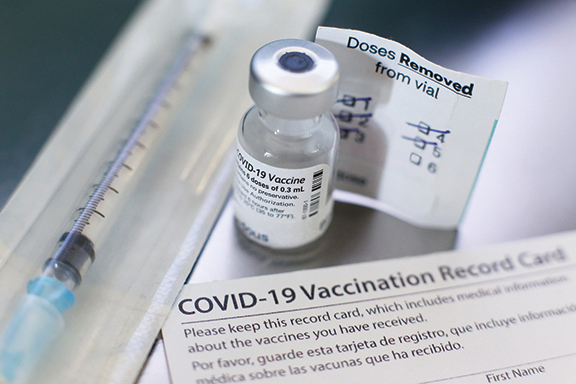
By Lee Egerstrom
Businesses and entertainment venues throughout Minnesota are quickly imposing requirements on patrons and customers to show proof of COVID-19 vaccinations. The state is now following suit.
If you want to work in-person jobs with state agencies, or with state agencies to work with the general public, you are now required to show proof of vaccinations. If you don’t, you will be required to have negative COVID-19 tests at least once a week.
This comes close to being the so-called “immunization passport” that many health experts say is necessary for life and business to return to normal. But it is politically controversial among those who still think the global pandemic is a hoax and others that think a state-ordered vaccination mandate exceeds state authority.
The new state policy went into effect on Sept. 8. At the same time businesses and other public gathering places struggled with ways to keep employees and the public they serve safe from the virus and it’s more contagious and deadly delta variant. These companies and service providers were imposing their own vaccination mandates.
Theaters, bars, restaurants, various other businesses reopening to the public, and most Minnesota colleges and universities began requiring proof of vaccinations from employees, the public and students.
It is no easy task trying to function in the COVID-19 environment, said Mary LaGarde, executive director of the Minneapolis American Indian Center. Everything the center does, and how it works with groups and people, has to be weighed against the risks, she said.
The center’s Gatherings Café did reopen to the public in the past year but has had to close again, she said. That is because the café has difficulty finding people to work.
With food service positions, close personal contact among people is inevitable. The hospitality industries across the entire nation are having trouble finding and keeping employees.
Mandates, proof of vaccinations, and general public health measures are certain to spread and impact other organizations, including those in the Native communities, which provide services and interaction among the public.
While the state agencies, businesses and organizations with a face to the public wrestled with vaccine mandates in September, widely published and broadcast news events chronicled the struggle with the pandemic. Here are some:
Minnesota has now surpassed 700,000 confirmed coronavirus cases. While that represents about 12 percent of Minnesota’s population, University of Minnesota infectious disease experts estimate as many as 30 percent may have become infected. That includes projected numbers of people who haven’t sought medical treatment or had only mild, undiagnosed symptoms.
Minnesota has now surpassed 700,000 confirmed coronavirus cases. While that represents about 12 percent of Minnesota’s population, University of Minnesota infectious disease experts estimate as many as 30 percent may have become infected. That includes projected numbers of people who haven’t sought medical treatment or had only mild, undiagnosed symptoms.
The latter can be carriers, or spreaders, even though they have stayed out of hospitals or been treated at health clinics.
Hospitals and clinics also report staffing problems. In some instances, healthcare workers are scared to expose themselves to the infected in fear of bringing the virus home to their families.
Across North America, hospitals are also under stress because children are now filling emergency and hospital rooms by getting sick from the delta coronavirus variant. This has federal health officials considering vaccines for younger people, under age 12, to ward off the rapidly spreading virus.
Stillwater and other Minnesota school districts are having problems finding school bus drivers to transport unvaccinated students to their schools, prompting family members or friends to drive the students.
Resistance to mandates and health precautions also appear to be rising. People have become hostile at school board meetings where masking policies have been discussed. It spills over to other public places and work places as well.
Opposition to mandates even come from sectors the mandates seek to protect. Two cases in point are law suits brought by a University of Minnesota Duluth student trying to block a vaccine mandate for students imposed at University sites and campuses, and by 180 Minnesota-based health care workers opposing vaccine mandates.
The latter case, while a distinct minority of health care workers, argues the mandates violate religious freedoms and both state and federal law. A federal mandate requires vaccinations for workers at facilities receiving Medicare and Medicaid benefits and payments, and at companies that employ 100 or more people.
Against this pushback, the new state policy and subsequent help from the Minnesota Department of Health should lay groundwork for what may truly be a return to normal down the road.
In its new Policy #1446, employees, interns and volunteers who work in-person with the public need proof of full vaccinations or take COVID tests at least weekly. “The state is strongly encouraging contractors and vendors, and their subcontractors, to implement similar protocols as it relates to their employees accessing state facilities to perform contractual services,” the announcement said.
This applies to indoor settings with regular in-person contact and outdoors where there is substantial or regular in-person contact with state employees or with the public.
It doesn’t apply to outdoor construction, building and grounds services, maintenance contracts and for contract work indoors in unoccupied spaces.
The Department of Health announcement told contractors with the state that the new policy encourages but doesn’t require that their staffs be vaccinated.
“If your staff who work in a covered project setting are not fully vaccinated against COVID-19, however, they are subject to mandatory testing,” the statement said. “Those who are subject to mandatory testing will not be permitted to access state worksites in covered project settings to perform work under your contract if they refuse testing.”
To help the general public and especially families show proof of immunization records, the state has provided an online app (https://docket.care/) that shows personal immunization records. This, in effect, becomes a handy “passport” to enter places requiring proof of vaccinations.
Health Department officials said this app was developed because proof required by employers and organizations have tripled public requests for vaccination cards and records this year.
Kris Ehresmann, state infections disease director, told media the app will be useful to access immunization history and remind families when children may be due for vaccines.
“This is vital to making sure people are protected from preventable diseases,” she said.
The state’s new online app for showing vaccinations histories can be accessed at https://docket.care.
A good, if temporary, roundup of places requiring vaccinations can be found at https://mspmag.com/arts-and-culture/general-interest/a-list-of-places-requiring-vaccinations-or-negative-tests.






